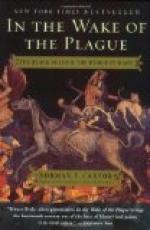His mood is that of Scott when Scott was young, and was so anxious to possess a death’s head and cross-bones. The malady is “most incident” to youth, but Mr. Stoddart wears his rue with a difference. The mad monkish lover of the dead nun Agathe has hit on precisely the sort of fantasy which was about to inspire Theophile Gautier’s Comedie de la Mort, or the later author of Gaspard de la Nuit, or Edgar Poe. There is here no “criticism of life;” it is a criticism of strange death; and, so far, may recall Beddoes’s Death’s Jest-Book, unpublished, of course, in 1830. Naturally this kind of poetry is “useless,” as Mr. Ruskin says about Coleridge, but, in its bizarre way, it may be beautiful.
The author, by a curious analogy with Theophile Gautier, was, in these days, a humourist as well as a poet. In the midst of his mad fancies and rare melodies he is laughing at himself, as Theophile mocked at Les Jeunes France. The psychological position is, therefore, one of the rarest. Mr. Stoddart was, first of all and before all, a hardy and enthusiastic angler. Between 1830 and 1840 he wrote a few beautiful angling songs, and then all the poetry of his character merged itself in an ardent love of Nature: of hill, loch and stream—above all, of Tweed, the fairest of waters, which he lived to see a sink of pollution. After 1831 we have no more romanticism from Mr. Stoddart. The wind, blowing where it listeth, struck on him as on an AEolian harp, and “an uncertain warbling made,” in the true Romantic manner. He did write a piece with the alluring name of Ajalon of the Winds, but not one line of it survives. The rest is not silence, indeed, for, in addition to his lays of trout and salmon, of Tweed and Teviot, Mr. Stoddart wrote a good deal of prose, and a good deal of perfectly common and uninspired verse. The Muse, which was undeniably with him for an hour, abandoned him, or he deserted her, being content to whip the waters of Tweed, and Meggat, and Yarrow. Perhaps unfavourable and unappreciative criticism, acting on a healthy and contented nature, drove him back into the common paths of men. Whatever the cause, the Death-Wake alone (save for a few angling songs) remains to give assurance of a poet “who died young.” It is needless to rewrite the biography, excellently done,




